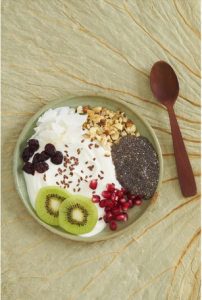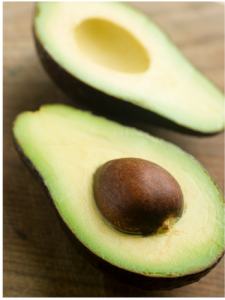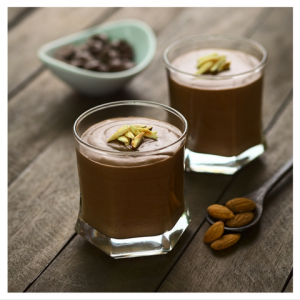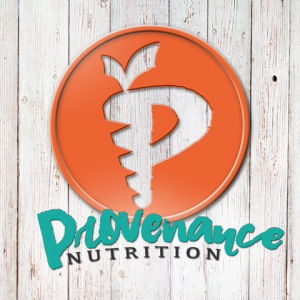You’ve peed on the stick… waited the agonizing 2 minutes… and holy heck you’re pregnant! Suddenly the take-out pizza on its way to your house for dinner seems woefully inadequate because you’re growing a tiny human now! For the record, I think pizza is awesome. But if you’re pregnant, you might want to add a side salad and some other green things to your plate… and keep the following 6 tips in mind to help your body (and growing babe) have the easiest (and best) pregnancy possible!
- Eat some protein at every meal (and every snack) – particularly at breakfast!
I know… breakfast might not be the most fun part of your day for the first trimester (or even beyond) but protein comes in lots of different forms. Try keeping a few options around and go with the one that seems the most appealing in the moment.
The amino acids that make up protein are the building blocks of your body’s cells (including your growing baby) and there’s a lot of building going on! Protein is also a solid source of energy and eating protein at breakfast can help keep your blood sugar more stable throughout the day (which helps take the edge off of the nausea, fatigue and brain fog). You need a significant amount more protein during pregnancy – there are differing opinions on exactly how much – but somewhere around 20% of your total energy intake (calories) or around 70 -90 grams is ideal. Steak, chicken, scallops, eggs and wild caught salmon are all sources of protein. But that doesn’t mean you have to inhale a steak a day – there are lots of plant-based sources of protein too!

You can add sunflower seeds as a salad topper, toss a tablespoon of chia seeds into your oatmeal (which is also a source of protein itself), smoothie or even just your class of lemon water! Chia seeds are probably my most-recommended source of protein because they are tasteless – and so versatile! Check out the recipe below for a yummy way to get chia seeds into you. Other good protein options are chickpeas, green peas, broccoli (yep!), almonds, hemp hearts (also a great smoothie addition), quinoa or brown rice.
- Eat fat! (yep – you heard me right)
In the past, for so many of us, eating “well” meant eating with weight loss goals in mind and that meant avoiding fat at all costs. Ice berg lettuce salads. Low fat yogurt. No fat cottage cheese. But one of the biggest things we have learned in the field of nutrition recently is that fat is absolutely necessary for your body to function properly and it is particularly important when you are pregnant. So don’t scrutinize how much fat you’re eating – but do pay attention to the kinds of fat you’re choosing. That’s the tricky part – good fats offer huge health benefits and bad fats can be destructive. Avoiding trans fats, partially-hydrogenated and PUFAs (polyunsaturated fatty acids) like canola oil, soybean and safflower oil and margarine is one of the biggest things you can do to help support your body.
So what types of fat should you eat instead? Well, good fats are found in pastured/organic animal products, oily, cold water fish, macadamia nuts, avocados, olives, nuts, coconut products and extra virgin olive oil. Most of these are good sources of saturated fat and we all need a certain amount of saturated fats to produce cholesterol. I know – craziness! We want our body to produce cholesterol! Because actually, cholesterol is needed for creation of healthy cell membranes and is a precursor to all steroid hormones (progesterone, estrogen, FSH, ect). In order to maintain proper hormonal balance (integral during pregnancy), you need to be consuming adequate amounts of healthy saturated fats.

Other good fats to watch for are Omega 3 essential fatty acids (EFA) which you have likely heard of! EFAs help to build the baby’s brain and nervous system especially in the last trimester of pregnancy and also help your body to increase absorption of fat-soluble vitamins A, D, E and K. While your new tiny human is growing, they will be consuming Omega-3 DHA (docosahexaenoic acid) from your body so it is essential to incorporate some into your daily meals. This is where my favourite little seed – the chia seed comes in handy! Chia seeds are a great source of Omega 3 EFAs. You can also consider taking a EPA/DHA fish oil supplement or Nutrasea also has a vegan formulat made from algae!
So the bottom line is, if you’re craving chips – look for the ones cooked in avocado oil instead of canola. Craving some sort of yummy chocolate chip cookie – check out the local independent bakeries in your neighbourhood or visit a farmer’s market – baked goods made by a small producer are much more likely to contain better quality ingredients. And look for ways to add fat into your meals rather than avoiding it. Add coconut oil to your smoothie, drizzle avocado oil on top of your vegetables, cook your eggs in good quality (ideally organic) butter, dip your celery in some almond butter. Inhale those olives and guacamole! Your body (and baby) will thank you.
- Salt it up!
During pregnancy, it is important that you salt your food! I know – fat is good and you’re telling me to eat salt?! Nutty. But the sodium added to packaged and prepared foods (soups etc) is a very different thing than a good quality sea salt. Sea salt contains lots of trace minerals like iron, zinc and potassium which your body needs. And pregnancy is not a good time to skip the salt because it helps to maintain electrolyte balance and ensure the fluids you are drinking get where they are supposed to go – into your cells rather than hanging out between cells (contributing to thrilling things like swollen ankles). Proper electrolyte balance also helps to avoid the fluid just passing right through you – because you really don’t need to pee more often! So choose a good sea salt (Himalayan pink salt is one example) and add a pinch to your meals or even your water bottle.
- Be on the lookout for iron!
Did you know that your blood volume will increase 50% during pregnancy? This is a HUGE task for your body. Iron helps this increased blood volume because it is necessary for formation of blood cells as well as transportation of oxygen to blood cells. There are two sources of iron, heme (from animal sources) and non-heme (from plant sources). And the cool thing is – if you eat both a plant and animal source of iron together – it enhances the absorption of both! So give your body a hand with this herculean effort, eat some dark green leafy vegetables like Swiss Chard, kale or collards every day. Sautee these dark leafy greens in some butter, garlic and add a pinch of salt – so good! Also, nibble on some pumpkin or sunflower seeds, stock up on eggs, chicken, bison and other red meat (if you’re of the carnivore persuasion!) Not so much? Well, add a drizzle of black strap molasses to your baked apple and pick up some Nettle tea.
- Get out in the sunshine!
Living in Canada with our dark, chilly winters – we have all heard about the importance of vitamin D. But did you know that vitamin D can also be hugely helpful in supporting a healthy pregnancy and uncomplicated delivery? Vitamin D plays many roles in our bodies – it helps to support the immune system, regulates cell growth, helps reduce inflammation, increases muscle strength, aids the body in hormone production, and may help prevent depression.

But recent studies have revealed that vitamin D can do even more! Research is showing that pregnant women may benefit from supplementing additional vitamin D outside of their prenatal vitamin (and make sure you’re taking a rocking prenatal!) to help prevent premature labour, pre-eclampsia, gestational diabetes and infections. Sounds pretty spectacular right?
So you have a few options – one is sunlight. It’s estimated that up to 15 minutes of daily sun exposure on the hands, arms and face around 12 p.m. during the spring, summer and early fall can provide Canadians with 1,000 IU of vitamin D. You can incorporate foods like eggs and fatty fish into your meals and you can also consider taking a vitamin D supplement (widely available at any health food store). Many women choose to avoid fish during pregnancy due to concerns about mercury toxicity, so make the choice that is best for you. But whatever you choose, embrace the sunshine. Take a deep breath and turn your face up to the sun and give yourself a mental hug – you’re growing a human from scratch right now. You’re a super hero.
- Be kind to yourself
Ummm… what does that have to do with nutrition? Well, when you’re pregnant, everyone has an opinion. About everything. Particularly nutrition. The magic solution to morning sickness. The things you HAVE to eat and the things you MUST NEVER eat. Food can quickly turn into a stress-filled minefield with the brand new tiny human’s life hanging in the balance! Arrgh. Because suddenly being the temporary home for another human being isn’t stressful enough!
So don’t take anyone’s advice as gospel. Including mine. There is no one perfect way to eat while you’re pregnant and even if there was – stressing yourself out trying to be perfect is just stressing the tiny human out too! So eat some green things every day. Try to eat some protein and fat when you can make it work. Eat the pizza if that’s what you feel like – just maybe choose somewhere that makes it mostly from scratch. Your neighbor makes you a casserole but you have no idea if it has canola oil in it? Meh. Eat it and enjoy the luxury of not having to make dinner. If morning sickness means that the only thing that sounds good is white rice or raisin toast, then go for it.
Don’t get me wrong, food is your biggest source of energy, nourishment and a powerful tool to help your body through this intense time. But the important thing is just to eat food – real food and often enough to make sure you’re getting enough nutrients to sustain both you and your baby. And be mindful of how your body was doing going into your pregnancy. Is your current pregnancy the 2nd half of Irish twins? Did you struggle with Post Partum Anxiety or Post Partum Depression with your last pregnancy? Did you have trouble conceiving? Have you been an on-again-off-again dieter pretty much since you were a teenager? If the answer is yes to any of these questions – I would recommend checking in with a Nutritionist or Naturopathic Doctor to ensure that you’re getting all the nutrients/minerals that your body needs right now. Plus, always consult your medical doctor or naturopathic doctor before choosing supplements.
Even if you didn’t answer yes to any of those questions and you just feel overwhelmed and just want someone to tell you what the heck to feed yourself (I feel ya!) – you can ask for help! You don’t have to do this alone – let’s find a time to chat and figure it out together!
Check out the yummy chocolate smoothie recipe below that works perfectly as a breakfast or mid day snack below for one idea.

Banana Nut Chocolate Bliss
½ of a frozen banana
1 cup of non-dairy milk (cashew, almond, coconut, rice or hemp – whatever sounds good!)
2 tablespoons organic unsweetened cocoa
2 tbsp chia seeds
1 date, pitted or 1 tablespoon of honey
1 handful raw fresh spinach
1/2 teaspoon organic vanilla extract (optional)
1 tsp raw coconut oil
1 tbsp nut/seed butter (almond, cashew, sunflower)
½ of an avocado
water if needed
Blend together and enjoy! The best thing about this recipe is that it is versatile – spinach sounds like a terrible idea today? Skip it. Bananas not sitting well? Skip them too. The consistency might change a bit but there are so many nutrient-packed ingredients in there – you’ll still have a fabulous snack/breakfast.
This recipe also freezes really well. You can make a batch – put into mason jars (leaving room at the top for expansion when the liquid freezes) for up to 10 days. Take out of the freezer at night and pop into the fridge for a yummy breakfast or take frozen from the freezer in the morning and it will be thawed by afternoon!
Like the sound of that? Check out my Facebook group “Nutrition for Eating and Living Well” for more nutrition and lifestyle tips that always make sure that food stays simple and fun. You can also check out my website at www.nutritionottawa.ca.
Jessie Lindley, M.A., R.H.N

Jessie holds a Master’s degree in the “Politics of Food” for Queen’s University (food has always been her passion) and she became a practicing Registered Holistic Nutritionist to live that passion – to help get at the root cause of her clients’ health problems (as she had learned to overcome her own health challenges) and most importantly – to reintroduce the joy back into learning to make healthier food choices. The journey to improved nutrition is not about short term deprivation – it is about long term sustainable balance that is both empowering and joyful! Jessie’s practice includes clients with a wide range of digestive issues, weight loss goals and has a particular focus on fertility nutrition and women’s reproductive health. You can learn more about her practice by checking out her Facebook page or joining her free community Facebook group for nutrition and lifestyle tips on eating and living well!


Leave a Reply